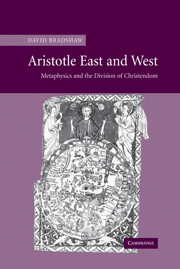Book contents
- Frontmatter
- Contents
- Preface
- 1 The Aristotelian beginnings
- 2 The Prime Mover
- 3 Between Aristotle and Plotinus
- 4 Plotinus and the theory of two acts
- 5 The Plotinian heritage in the West
- 6 Gods, demons, and theurgy
- 7 The formation of the eastern tradition
- 8 The flowering of the eastern tradition
- 9 Palamas and Aquinas
- 10 Epilogue
- Bibliography
- Index
1 - The Aristotelian beginnings
Published online by Cambridge University Press: 22 September 2009
- Frontmatter
- Contents
- Preface
- 1 The Aristotelian beginnings
- 2 The Prime Mover
- 3 Between Aristotle and Plotinus
- 4 Plotinus and the theory of two acts
- 5 The Plotinian heritage in the West
- 6 Gods, demons, and theurgy
- 7 The formation of the eastern tradition
- 8 The flowering of the eastern tradition
- 9 Palamas and Aquinas
- 10 Epilogue
- Bibliography
- Index
Summary
Although Aristotle never takes credit for coining the word energeia, there can be little doubt that it was his own invention. It appears nowhere in extant Greek literature prior to Aristotle, and even for some decades after his death it is restricted mainly to philosophical writers, particularly those of Aristotle's own school. By contrast, it occurs 671 times in Aristotle's works, about once for every other page of the Berlin edition. Unfortunately Aristotle discusses its etymology only once, remarking briefly that energeia is derived from “deed” or “thing done” (τὸ ἔργον) (Met. ix.8 1050a22). Although this gives us the ultimate source of the term, the combination of en with ergon already had precedents in Greek, and it is likely that one of these was the more proximate source. The two available candidates are energos, an adjective meaning “active, effective,” and energein, a verb meaning “to be active or effective, to operate.” In either case the root sense of energeia is something like “activity, operation, or effectiveness.” To say more than this based on etymology would be rash.
One way to proceed at this point would be to list its various meanings in dictionary fashion, illustrating each by representative texts. Such a procedure would not explain what united the various meanings in Aristotle's mind and why he believed it appropriate to use the same term for them all. It would thus risk missing the term's more subtle nuances.
- Type
- Chapter
- Information
- Aristotle East and WestMetaphysics and the Division of Christendom, pp. 1 - 23Publisher: Cambridge University PressPrint publication year: 2004



